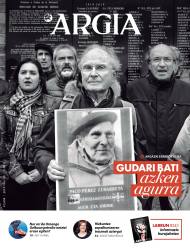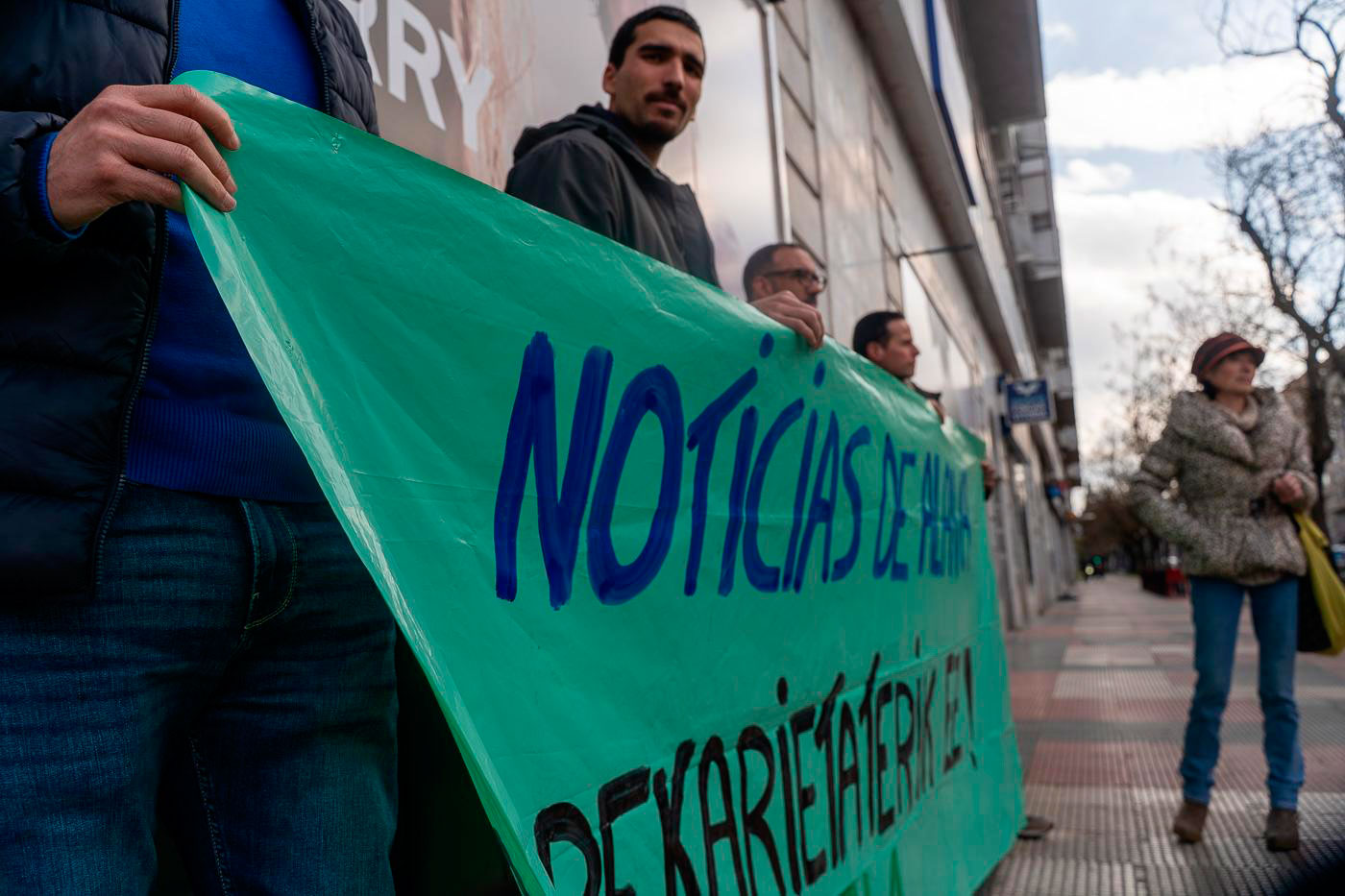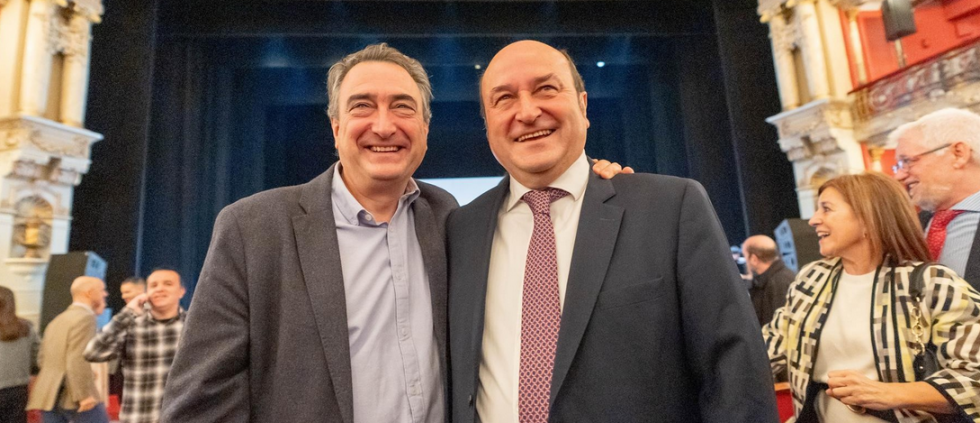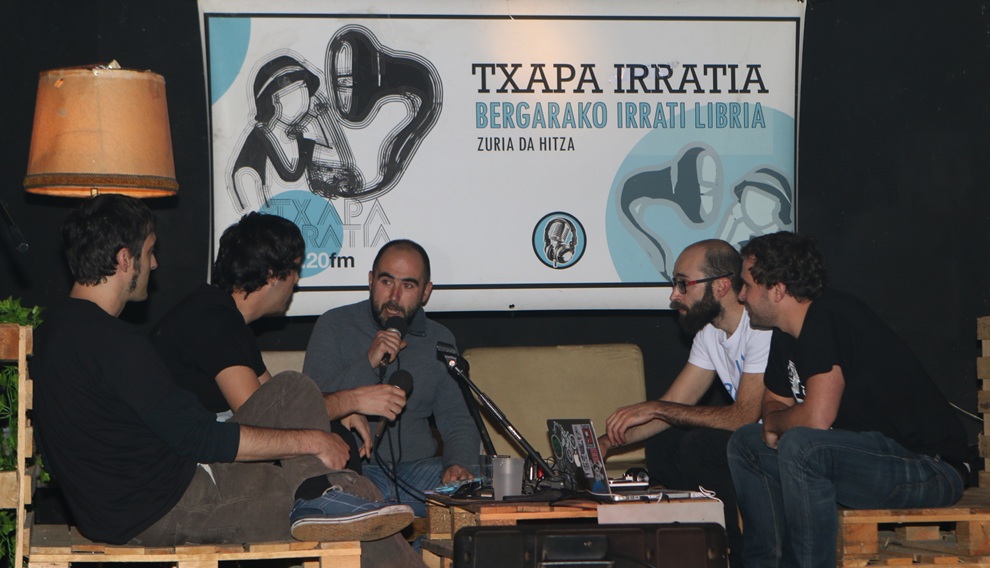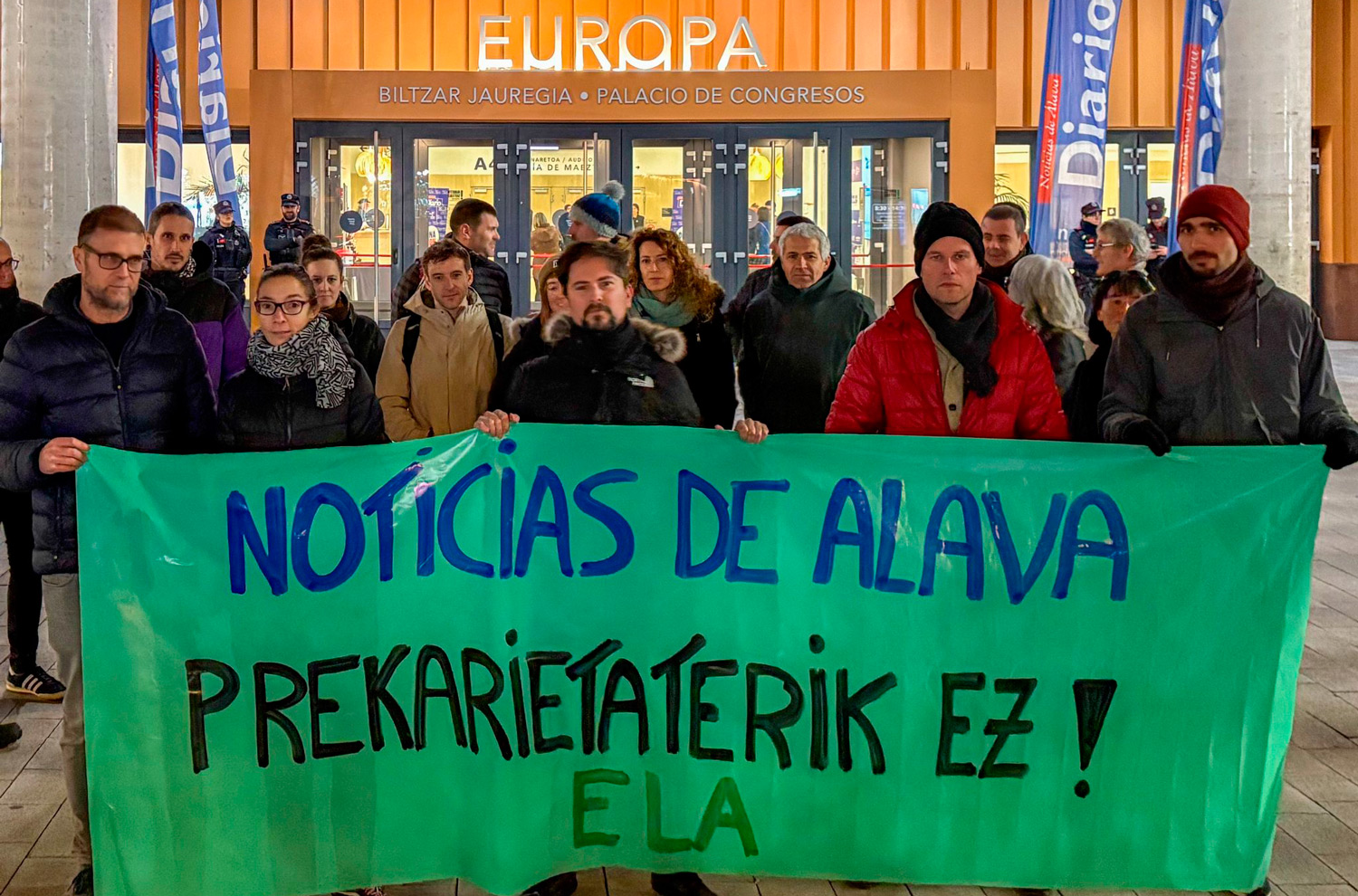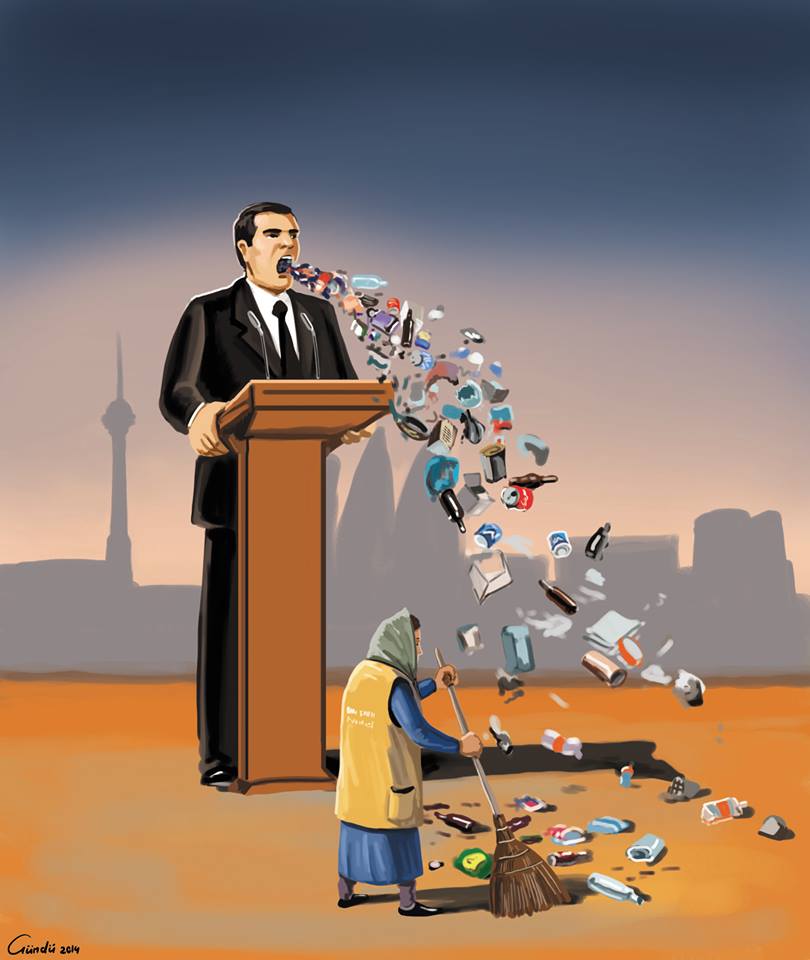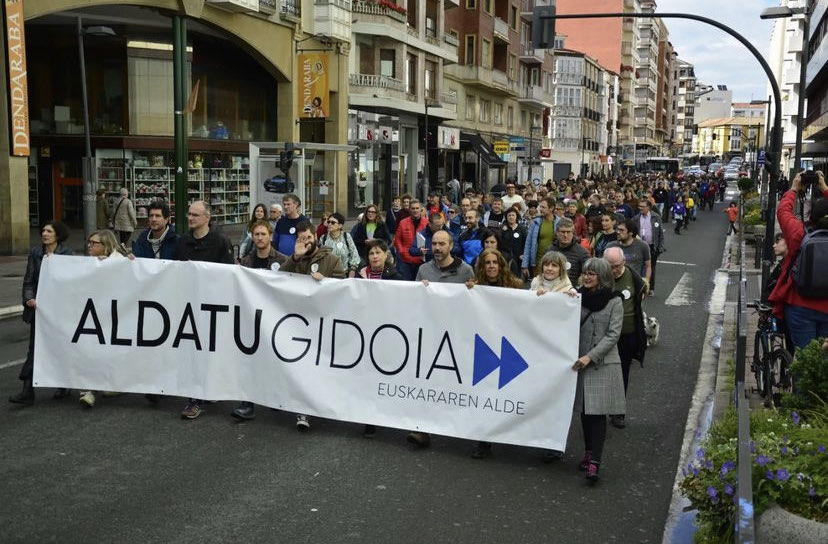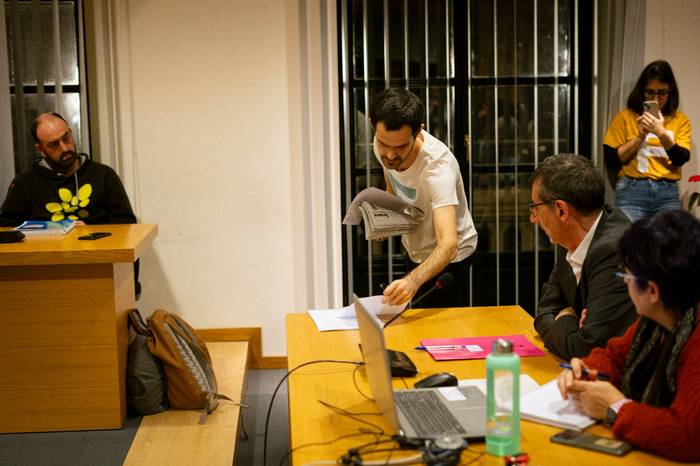"The hegemony of information-based power is in crisis."
- Vitoria, 1955. Neighbor of Egia de San Sebastián. Bachelor of Philosophy and Literature from the Complutense University of Madrid in 1978. Professor of the UPV and the UEU. PhD in Education Sciences. Writer. Fake News isn’t yesterday morning (Utriusque vasconiae). “Information has become an industry, but the information industry cannot be hierarchical and control everything,” he says.
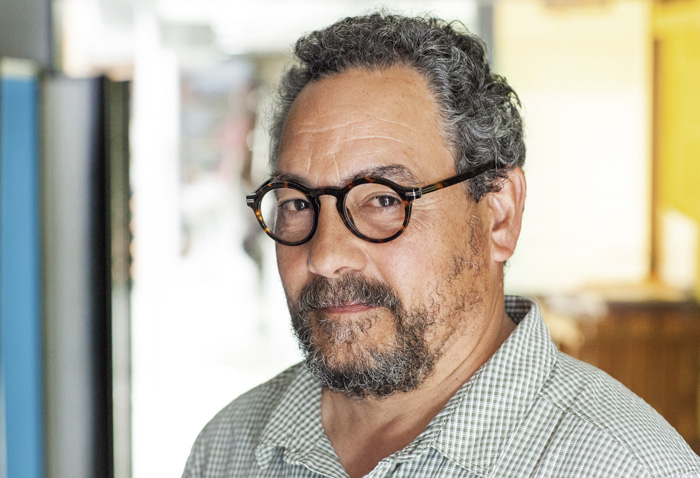
You talk about the Bible in the book. Should this religious book be classified as educating and raising with it ginen.Zein?
The Bible is the story of stories, the sacred story. The Koran is the same thing. Both are the religions of a single book. To understand why one must understand the “contradiction of Alexandria”. The Library of Alexandria was very rich, and yet early Christians said that all truths were in the Bible. They think we don't need other books. Worse still, if the truths are not in the Bible, they said that we must withdraw all the other books so that the truths are no more than in the Bible. That's why they burned the Library of Alexandria. The Muslims, fanatics of the Koran, came later and did the same. That is, the books of religions seek truth in the writing of books. Because writing allows us to “read the world.” Today, several philosophical currents have emerged, but the interpretation of the philosopher Hans-Georg Gadamer basically serves us: We have to “read the world” as if it were a book.
Going deeper into that interpretation?
We have been educated and grown up in a literate world. We understand everything from the point of view of literacy. In the old graves they would write verba volens. I mean, the word flies. We, from the point of view of literacy, have learned that words are brought by the wind, that what really revolutionizes the person is the written word. On the other hand, in “non-literate cultures”, in oral cultures, that is quite the opposite. That is, the wind brings the words to any place, for them the written word does not serve. The word is forever written in the grave, while the oral word reaches everywhere.
Today...
Today we live two types of knowledge: on the one hand, the orality of everyday life and, on the other, written activity. These two knowledge have been combined in the digital age, especially since the creation of social networks on the Internet. Therefore, for ten years, knowledge of information has changed radically.
Going back to the origin of education, to the Bible: people have grown up on lies.
Yes. Little has been investigated about lying and much less has been written. I have taken as a reference the work of the philosopher Jacques Derrida. But in addition to Derrida, we also have the work of the German sociologist Georg Simmel. For him, in sociology, it was essential to keep lying in mind, because we live in lying. In the critical book of Derrida, in my short, of course. The approach to driving is: “For the lie to be real, it has to be specific, that is, the lie has to be intentional, it has to be subjective.” I say no, that one of the fundamental variables of our life system is lie, base and axis.
What do you cover?
In nature, for example. Let's take a look at animals or plants. Plants take shape, in some way, to make bees pollinate, attract and bring their seeds to other places. Look at the hunting suit that the leopard has developed to camouflage in nature. But does the leopard want to lie? Is it intentional? No. It has to perpetuate itself and species. Intentionally he has no subjectivity, he does not lie, but he also does hunting and for that he has to use lying.
Where do we place the human being?
We live as animals in lies, because lies are within us. Human beings are a consequence of the religions of books and of the education of the ideologies of books. Those of us who have learned from them, at the end of the day we learn to work a kind of faith, we believe what we read.
People usually say an average of ten lies a day. Politicians four times more. Journalists…
...and teachers (laugh)? In the book I mention a story by Quim Monó. From the young couple in love: “We love each other so much that we are not going to lie to each other,” they decided. Well, it's the end of the couple. Through love, we must believe each other through faith, we cannot say everything, it is impossible. Without lies, we could not continue in the world.
As power increases, lies multiply.
Power reaches its legitimacy in the hegemony of truth, power must control the production of truth: the religious, legal, scientific truth or the truth of society.
In this sense, what is the situation we live in in the field of information?
“Human beings are a consequence of the religions of books and of the education of the ideologies of books. Those of us who have learned from them, in the end we learn to work a kind of faith, we believe what we read.”
At the moment people are not calling into question the production of news, at least enough. For example, until recently, what the newspapers El País or New York Times, the major television or radio stations, said dominated society. Today, unlike the recent past, everything is wobbling. People have other origins to feed, which do not appear in the main media to access and contrast through social networks. But at the same time, we don't question how we collect and transmit data from information. At the very least, it is not enough. The information transmission system has therefore been modified. The industrial age, capitalism, was based on one type of production: hierarchical, organized and controlled production. The people who made the chain almost didn't know what they were doing. Today, information has become an industry, but the information industry cannot be hierarchical and, above all, cannot control everything. Therefore, the horizontal mode has been extended, the control of information has become difficult, the information is uncontrollable.
Are we experiencing the crisis in the information industry?
No, or not in the same way. Power seeks to legitimize hegemony. We are experiencing the crisis of the hegemony of power, a power based on information. That is, power is what's at stake, not the way information is disseminated.
“Fake news or zurrurrurrurrurrurrurrurrurrugas are the expression of a society,” is the thesis of his book. Explain yourself a little.
Fake news is not just fake news, but what matters is not whether they're fake or true, but what they tell us about society. Contemporary stories – internet and social networks – inform us of the situation of society. The news gives us a theme to understand and transform us into a society.
Are we better than 10 years ago?
Yes. But we should not assess whether we are much better or much worse. As the rules of the game – the battlefield – have changed, as more resources are available, we are more likely to fight, because the truth is combative.
In any case, rumors fascinate us. And that's dangerous.
Rumors dazzle us when we think information is insightful and truthful, because rumors work through a simple system: secrecy, sex and money, among others. These characteristics, their sharing, fascinate us at all because they lead us to something we don't know.
It also refers to the Pigmalion effect. This is produced by oral expressions.
"Fake news is not just fake news, the important thing is not whether they're fake or true, but what they tell us about society."
I started the book with the fable of Artzain txikia: the pastor says the wolf comes and people will help. It's a lie. After insisting on it, people are finally not going to help. The wolf kills the whole herd. We tend to use that fable to say that it's bad to lie, that in the end nobody believes us. However, it should serve us to understand that lying works when people believe. With fake news that happens, because people believe, because in the end, their functionality and their operativeness serve. In other words, inside information is based on what is credible. To control it, the first functionalist or behavorist works were created in the United States, with the help of researchers such as Allport or Postsman, led by the Pentagon. When the bombing of Pearl Harbor took place, the knife opened. Until then, the United States had not received any attack from its enemies at home. That caused panic in society, the rumours spread and believed that they had to be controlled. The University was the place where the first investigation into rumours began, but the investigation was secretly directed by the Pentagon.
Information control is fundamental to power.
It is obvious. For example, here we know a lot about what the Germans have done to the Jews, about concentration camps. However, what they did in the United States with Japanese, Chinese or Korean is not known: At the time of Pearl Harbor, many of the inhabitants of the local Asian community were imprisoned, many of whom were controlled. They were Americans of the third generation of Asians, and yet they were persecuted.
These methods have also been used here, to some extent.
Yes. An example of this is the ZEN Plan. General de la Guardia Civil, Andrés Cassinello, studied at the School of the Americas (Panama) of the United States to do a job as a contractor. He exerted psychological action to control the information. A good example of this is the one written by the former director of El Mundo to report on the events surrounding the attacks of 11 March 2004. That is, they controlled all the information to say it was ETA. And it was a lie.
Currently, the areas of information have been expanded and modified.
Yes, unlike in the past, rumours spread through social media, we consider them authentic, but the most dangerous thing is not that, but they are uncontrollable. Therefore, the areas of information in powerhouses are being investigated to control their forms of use. However, in addition to this, we must know how oral literature or stories work, since the information they provide is not only information. Information is formats, they are within a history, they sell us a story, but that formation shapes the information. Hence the Pigmalion effect. I mean, to understand the world, we have to know what kind of information we collect, because it's something that happens within a story. Thus, researchers are searching, designing and channeling a solution to make proposals.
Are polling polls fake news?
“As the rules of the game have changed, as more resources are, we are more likely to fight, because the truth is combative.”
They are also partly a consequence of the Pigmalion effect. They report what is going to happen and channel information through this effect. But that's not just about surveys. For example, why have Bolsonaro, Trump or Brexit won? In the case of Trump: Sworn in the appointment of President of the United States, he said: “This is the most important welcome that has been given to a U.S. president throughout history.” It was fake news. Immediately, the New York Times, the Washington Post, the BBC and CNN compared pictures of Obama with those of Trump on his travels. The welcome he gave to Trump didn't make up a third of Obama even once. But Trump has already warned that "those media are creating fake news." The creators of fake news are my enemies. Believe me, not those others,” he said. Damn it! He won in the fight against that usual and powerful press. Because he fought, not in his field, but through social media.
Through social media. But how?
Algorithms. We users give our data in real time every day. All of this data is produced, so it's possible to reach each person and tell that person what they want to hear. Trump or Bolsonaro, and here the Right, use the issue of immigrants: every person receives what they want to hear. Of course, not all networks are the same: Facebook, Whatsapp or Twitter... Maybe the whatsapp is the most dangerous, because we use it among people nearby, because we heed each other. Through them, fake news spreads easily. That's why it's really hard to oppose fake news, which is not objective, but subjective. Playing against what you want is very difficult. If we control the data, people will hardly change their minds and believe what's amazing.
Yes! ?
Yes, because to a large extent people want it.
Iñigo Urkullu lehendakariaren “Ez zen bidezkoa izan” lemaren harian. Nola baloratzen duzu ETBk horrelakoez zabaltzen duen informazioa?
Hau da, kazetaritzatik nola kontrolatzen den informazioa, ezta? Kasu horretan, ETB akronimoa hartuz, ETB ETBatzokia da. Adibidez: ekainaren 3an 40 urte bete ziren Gladys del Estal Tuteran hil zutela. Donostiako Egia auzokoa zen. Nik Gladys ezagutzen nuen, egun hartan han nengoen, ene besoetan hil zen. Biharamunean gure beste lagun bat atxilotu zuten, neska abokatua. Egiakoa zelako eraman zuen poliziak eta hauxe galdetu ere: “Tu conocías a Gladys?”. “Si, era una ecologista”. Poliziak, berriz: “No. Era una agente terrorista, venezolana”.
ETBk erreportajea egin zuen gaiaren inguruan. Nik parte hartu nuen, eta hauxe esan ere: “Hemen inportantea da gogoratzea EAJ eta alderdi denak zeudela energia nuklearraren alde. Areago, estatuko indarrak eta estatuaren baliabideak zerbitzu pribaturako erabili zituztela negozio bat babesteko, zehatz-mehatz, garai batean Iberduero zenarena, gaur egun Iberdrola denarena. Horiek proiektu pribatu bat babestu zuten bitarteko publikoekin”. Baina esandako horiek denak ez ziren azaldu erreportajean.
Testu bakoitzak testuinguru bat behar du, baina ETBatzokia-ren bidez horiek ez dira azaltzen. Errelato bakarra nahi dute agerrarazi.
Beste adibide bat: Euskara Batuaren eta Txillardegi-ren inguruan egindako errelatoa ez da bidezkoa. Nor geratu da errekonozitua eta nor ez? Txillardegi ez.
Gaur abiatu da Bizi Baratzea Orrian kide egiteko kanpaina. Urtaro bakoitzean kaleratuko den aldizkari berezi honek Lurrari buruzko jakintza praktikoa eta gaurkotasuneko gaiak jorratuko ditu, formato oso berezian: poster handi bat izango du ardatz eta tolestu ahala beste... [+]
Alemaniako Poliziak asteleheneko gertakariaren arrazoiak "politikoak" zirela baztertu duen arren, 35 urteko Alexander Scheuermann Ring Bund talde neonaziko kide zen. Bi hildako eta hamar zauritu utzi dituen atentatuaren egileak sare sozialetan "gorroto mezuak"... [+]
Lan baldintzen "prekarietatea" salatzeko kontzentrazioa egin zuten asteartean egunkariaren egoitzaren aurrean. Abenduaren 2tik sindaura greban daude langileak eta mobizlizazioak "areagotzea" erabaki dute orain.
Urtea baino gehiago da Olatz Simonek –EITBko berriemailea Parisen, garaian–, orrialde hauetan bertan ohartarazi zigunetik Bruselak kazetariari lanbideaz erakusten dionaz. Eta halaxe joan gatzaizkio galdezka Amaia Portugali. Bruselan gure irrati publikoak duen... [+]
Langileek salatu dute zuzendaritzak ez diela lan baldintzen gaiari heldu nahi izan eta enpresak nahiago izan duela Gaztea Sariak ekitaldia bertan behera utzi, “horrek sortutako albo-kalte ekonomiko eta sozial guztiekin”, arazoari irtenbidea eman baino.
Joan den asteartean La Vanguardia-n argitaratutako artikuluan egin zuen proposamena Txema Montero abokatu bizkaitarrak. 30 urtez Deia egunkariko kolaboratzailea izan da eta lehenik hara bidali zuen bere artikulua, baina egunkariak ez zion argitaratu.
Hemendik aurrera egunkarian soilik "norbanakoen askatasuna eta merkatu librea" sustatzen dituzten iritziak jasoko direla adierazi du enpresaburuak. Iritzi artikuluen zuzendariak hedabidea utzi duela ere argitaratu du.
Egitarau mardula prestatu dute Bergarako irrati libreko kideek: musika, literatura eta tailerrak. Besteren artean, martxoaren 29an Txapa Eguna egingo dute.
Diario de Noticias de Álava (DNA) egunkariko langileak sinadura greban daude, eta aspaldi ari dira beren lan baldintza “miserableak” eta horiek kazetaritzaren kalitatean duen eragina salatzen. 2013tik soldatak izoztuta dituzte, eta ordutik erosahalmenaren %30... [+]
Palestinan genozidioa, Europan gerra eta potentzia nuklearren artean tentsioa. Ez daukagu berri on askorik emateko, baina bada bat, hondamendi orokorretik eratorria, aipatzea merezi duena: aldeko baldintzak sortzen ari dira kontrainformaziorako, informazio independenterako,... [+]









